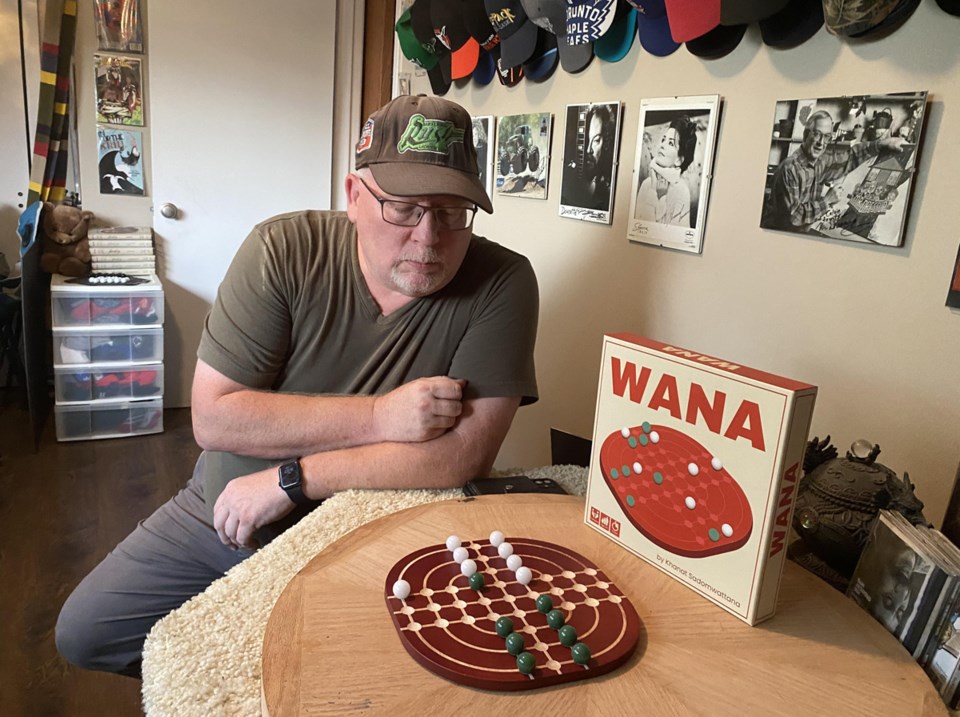YORKTON - It’s so tempting to start by suggesting you are going to ‘wana’ play this one – but maybe that’s a bit to over-the-top.
Still as a game Wana is a game you might well be interested in if you like lightning quick games.
The box suggested a play time of five minutes, and you might need a bit of analysis paralysis to stretch a lot of games out that far.
So Wana is a very quick and simple abstract strategy game about positioning and outmanoeuvring your opponent.
There are only really two rules;
On your turn you must move one of your marbles, then if you trap one of your opponent's marbles, you win.
On the positive side this is a coffee break game, even in a 15-minute break you could get in a best-of-three, and since set-up is maybe 30 seconds, you can still leisurely drink your tea.
The negative is that when a game plays out in a flash, you are not going to find a lot of strategic depth here, so while Wana might find a home as a filler game, while you wait for someone to show-up for Pandemic, it is not one to hold long term interest as you work to learn what works best.
The board is wood, which is a plus, although mine has bowed a little, so probably needs felted to stop it from teetering.
Since the pieces are marbles, teetering is a bad thing because the marbles might move.
That is even more of an issue here where the cups drilled for the marbles are a bit too-shallow. The marbles shake rather easily, so if in a coffee shop and someone bumps your table you might be chasing little white and green spheres.
Wana was created by Khanat Sadomwattana and was produced after a Kickstarter crowdfunding campaign.
Sadomwattana told The Meeple Guild via email he “used to play a lot with my friends during college but after moving countries I now mostly play two-player games and party games with my wife and her friends.
“My favourite game is Quoridor.”
So how did Sadomwattana come to create Wana?
“Wana started from a combination of two ideas,” he said. “I wanted a simplified version of Go that still retains part of its soul - particularly the idea of multiple parts of the board having down stream affect on one another and the concept of Sente - the idea of initiative that forces your opponent to act otherwise they would be significantly disadvantaged.
“The other was the fact that I wanted a game that takes place on a Rubik's cube.”
While you can perhaps see Go as an ancestor of Wana, it is a bit of an unfair comparison in as much as Go is a deep game that many hold as the best abstract strategy game ever created and Wana is a five-minute blitz.
In play depth are about as far apart at the extremes of abstract games as you will get.
You must enjoy Wana for an entirely different set of reasons than you would Go.
“What I wanted to achieve with Wana is a game whose simple rules and limited available action belies its strategic depth,” said Sadomwattana. “A combinatorial game of no luck that is capable to moment of surprises and dramatic reversal.
“I also didn't want a long drawn out game where victory or defeat is determined by counting up points or territory.”
In terms of these goals Sadomwattana has done better.
I’m not sure huge reversals are typical here. The games play out so quickly it’s typically over before you see a trap, avoid it and counter for a win. This is go for the throat, and the first good move likely wins.
Still, as Sadomwattana noted, “What players can expect with Wana is a quick playing game of cat and mouse where you're taking turn chasing and being chased by your opponent. You're trying to trap them in a web of pieces that only as strong or as weak as its position relative to one another.”
Sadomwattana said he also likes how players interact in Wana.
“Each marble cannot affect one or another in anyway - you can move your opponent by pushing them or eliminate them - you can only move your own marble,” he said. “And yet somehow you must manipulate your opponent such that they are trapped. It seems like such an odd thing to try to do.
“I also like the fact that throughout the game you're playing with all eight marbles - you're never playing from a disadvantaged in number so at any point in the game - you're equal. It is only though clever manoeuvers can you win.”
Overall it’s a filler for abstract strategy fans, just don’t expect to be in awe of how deep the game is.
You can no longer count on social media to deliver your local news to you. Keep your news a touch away by bookmarking Yorkton This Week's homepage at this link.
Here's why you should bookmark your favourites.
Bookmark SASKTODAY.ca, Saskatchewan's home page, at this link.






